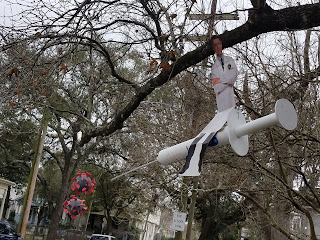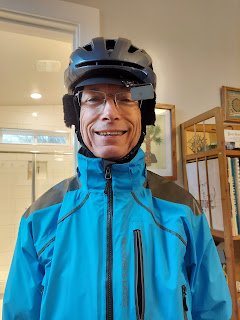Did you get your shot?
A
few months ago, a friend and I were discussing the the speed with which the
vaccine against SARS-CoV-2 was invented, tested, manufactured, and licensed for
use. She was contemplating holding back and waiting rather than getting a dose
as soon as her turn came. That we have a vaccine for a disease we only started
being concerned about less than a year ago is unheard of. Remarkable, amazing,
spectacular, revolutionary. But is it also scary? Does the happiness associated with such a
miracle give way to doubt, suspicion, and anxiety? I had been following the
vaccine for COVID-19 story closely, and although I always have some suspicions
when it comes to organized medicine and drug manufacturers, I had very little such
skepticism in this case. I noticed that after a couple minutes, I started feeling
a bit angry. I wanted to share with my friend my joy about the end of this horrible plague
being in sight, while my friend was manifesting anxiety that if shared widely
could lead to significant delays in achieving herd immunity (I like the term
community immunity better). I wanted us to jump up and down together cheering,
she wanted to throw a flag and bring the ball back.
 |
| A trusted superhero with a remarkable new weapon |
Early
in the pandemic, when it became clear that life was essentially never going to
be the same, and that the City of New Orleans was going to be in a prolonged
state of WTF?, I was pretty much in
favor of challenge trials for vaccines.
That’s where you give a group of volunteers either the vaccine or
placebo and then expose them on purpose to the virus. This is similar to what Edward Jenner did to
his 8 year old gardener’s son James Phipps in the late 18th century.
Jenner took some cowpox pus from a milkmaid and used it to infect the
child. James was sick for 9 days but survived. Several weeks later, Jenner infected the
child with actual smallpox and nothing happened. Success! It turned out that cowpox and
smallpox were similar enough that immunity to one afforded immunity to the
other. Today, just being a cool-ass doctor no longer allows you to head over to
the neighbors to get a child to
experiment on, but with informed consent it can be done and I wanted it to be
done for COVID-19. (I think there actually were some challenge trials done;
turns out that they did get volunteers. Some people were willing to assume
the risk either out of heroism or desire for money). Some experts refused to even talk about such a
heinous thing as challenge trials, totally and completely unethical they said. My thinking was (and is) that finding a vaccine would reduce the
total number of deaths and serious illness due to the virus. Therefore, even if some of the volunteers had
adverse reactions to the vaccine or if they were not protected and as a result
of being exposed, were seriously ill or died, the benefits would outweigh the
drawbacks, since having to wait a lot longer to get a vaccine would result in more
disease and more deaths than what would be caused by doing the challenge trial.
As it turned out, for many reasons and with lots of blame to go around, the
virus circulated widely in our country and so we got lots of vaccine trial
volunteers exposed, just by virtue of being Americans living in America, a
place teeming with SARS-CoV-2 virus. No need for challenging.
For several years I served as the clinical co-chair of the Immunization Committee at Group Health Cooperative, a non-profit staff model HMO in the Puget Sound region of Washington state. On our committee we had vaccine scientists, public health experts, infectious disease specialists, primary care clinicians and others. We reviewed proposed changes to the vaccine schedule and implemented the changes that seemed appropriate. I developed a faith in the process of vaccine approval that I still hold and feel is justified. When parents would question vaccinating their child according to the recommended schedule, I would point out that using an “alternative schedule” might work, but such a plan would be lacking in evidence for its safety and effectiveness, since large scale studies and ongoing monitoring applies only to the accepted schedule. A scientific approach strongly favors doing what’s been shown to be effective. Perhaps one should be allowed to use a different schedule, but doing so is essentially an experiment with an “N of 1”, like Jenner and Phipps, but hopefully without purposeful exposure to Measles, Mumps, Rubella, or any of the 12 other diseases for which vaccines are recommended on the current schedule in the U.S. (Vaccines exist for a total of 27 diseases currently, but some are not routine such as Yellow Fever vaccine).
What
about fear of big pharma and the health care system wanting to make money?
Shouldn’t we be a bit skeptical of modern medicine in general? After all, there
are plenty of examples where drugs are used inappropriately and surgical
procedures are performed which are questionable at best, seemingly done more
out of a desire for profit than to proceed carefully in the best interest of
the patient. And in the case of COVID-19, isn’t this uncharted territory, a new
type of vaccine? Are we really sure this
is OK? My reply is that we should be
skeptical and questioning. Happily, in
the case of vaccines, the approach to
their approval and inclusion on the schedule is perhaps the most open and
bias-free process in all of medicine.
Representatives of pharmaceutical manufacturers are not on the
committees. One can never entirely
separate corporate influence from the medical system, but it’s close to as good
as it gets in the case of vaccines. And mRNA vaccines are not really new, what’s
new is getting one marketed.
As
a retired 69 year old healthy and financially comfortable white male, the
personal stresses added to me by this pandemic are quite low
comparatively. In contrast, it’s hard to
even imagine the challenges faced by parents,
teachers, doctors and nurses, those working in front line jobs, those out of
work, pretty much everyone. So we need
for this to end and end soon. Were the Moderna
and Pfizer vaccines brought to market blisteringly fast in comparison to the
usual timing? Absolutely. Is our current
situation nowhere even close to “usual”? No question. That we have systems, scientists, and a
review process to ensure the quality and safety of new vaccines is truly miraculous. I have no doubt that the clear choice here is
to get vaccinated absolutely as soon as possible. You will be protected and be much
less likely to infect other people. By
following the recommendations, you will demonstrate a justified faith in our
health care system that will encourage others to follow your example. 
Yes, there are rainbows!
My friend has come around and has received her first dose, which she called her "Fauci owchy". My wife and I are scheduled for ours on Feb. 22. Not a moment too soon.
Bibliography of
Vaccine Resources
1.
Podcast: Endless
Thread from WBUR Boston and Reddit.
Series of 5 episodes called Infectious, which dropped in late April
of 2019. The focus is on the phenomenon
of vaccine hesitancy and refusal. It’s
chilling to listen to this production from our viewpoint now after enduring a
year of an actual pandemic, which they could only worry about back then. They feared thousands of potential
deaths. We are now close to half a
million. The hosts are Ben Brock Johnson and Amory Sevirtson.
2.
A majority of US Black adults surveyed
are worried about Covid-19 but only 49% plan to get vaccinated.
3.
Recently, Charles
Blow commented on the survey in a New York Times opinion piece.
4.
Neeti Sanyal and Shantanu Nundy explore
these issues in a Harvard Business Review article.
5.
CDC has a smart
phone based tool called V-Safe to add an extra data collection method to
track vaccine safety and adverse reactions.
You can sign up using the information on the card you receive after
getting your shot.
6.
I really loved Eula Biss’s 2014 book On Immunity. Bill Gates also commented on the book
in his Gates Notes post in March of 2015. The New York Times review linked to
above is quite eloquent. Human lives are so interesting, so complicated, so
potentially tragic, and we are so dependent on one another.
7.
The NPR program On Point had an informative
episode on January 5, 2021. In the show
notes linked to here
there is a strong list of resources, which I am working my way through. I
thought the ideas and actions of Miguel Rodriguez, who is a member of the
Community Advisory Committee of the Camden Coalition of Healthcare Providers
was particularly inspiring. He is featured in the podcast, and has been volunteering going door to door to ask people in his predominantly African American community about their plans, fears, and concerns regarding COVID-19 vaccination.
8.
How
to Talk to an Anti-vax Relative: article in The Atlantic.
9.
General immunization information sites that I
used frequently while in pediatric practice:
-Immunization
Action Coalition
-The
Vaccine Information Center at Children’s Hospital Philadelphia I just
looked at this site and there is an interesting piece there by the director,
Dr. Paul Offit, on the issue of delaying the second dose of COVID-19 vaccine so
that more people can get a first shot faster.
 |
| This is what it's come to down here. |



Thanks Rob. It is always incumbent upon the medical community to gain, and maintain the trust of the public. Their effectiveness in treating the public depends on this. It is interesting to know that betrayals in what could be considered the distant past linger and hinder that trust. When you talk about trials, these truths must be at the forefront of the decisions that are made, both in testing, and in passing a drug to public approval.
ReplyDeleteRob,
ReplyDeleteThought provoking comments. Certainly we’re all weary, to varying degrees I suppose, of the pandemic. I’m one of those who wants to celebrate, though any jubilation is tempered by the questions you bring up (can it really be this quick?) and the more certain knowledge that community immunity --I like that term too- will unfold only slowly.
Difficult ethical decisions with challenge trials. A bit analogous to war – it’s probably a lot easier to say it’s “worth it” to lose 5000 people in order to kill 30,000 of the enemy– if you’re not one of the 5000.
Last summer, a friend of mine was dragged in front of the Oregon Medical Board simply for publicly discussing possibilities of deliberate exposure (apparently at the proceeding, no one could quite figure out why they were all there. As closely as I could tell, it was a CYA move by the board due to complaints over his comments.)
And it’s surprising to me how many people are willing, even eager, to substitute their intuition, gut feelings and folk wisdom for what’s been scientifically proven. It’s comforting to learn that vaccines are more insulated from corruption than perhaps other pharmacology. I’m more concerned about the considerable number of people still subscribing to anti-vaccine concerns. I’ve tried to find any credible information supporting those views, but have only turned up articles supporting the safety of these vaccines, and the 10-some year history of their RNA design. Thanks for your thoughts and expertise. Randy
Thanks for that. As a (former) medical "insider", I realize how wide the variation is from practitioner to practitioner, from frankly incompetent and dangerous to such greatness as to inspire the (always misguided) impulse to revere as infallible. And as a member of a large medical group (Group Health Cooperative of Puget Sound, "Group Health" for short) I know from case after case that once a GHC practitioner's action or inaction leads to a poor medical outcome, the community often speaks of such mistakes as being committed by "Group Health" rather than noting the mistake was made by an all too imperfect individual. This tendency is writ large in the mistrust of "the medical community" where certain factions within the whole made poor or even evil decisions, thus giving fuel to the perception of "the other" (medical people) as being untrustworthy. But that's our human condition, and we work with it as best we can. For every Larry Nassar may there be twenty Tony Fauci's.
ReplyDelete